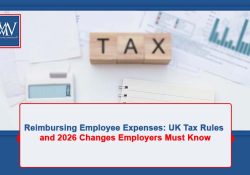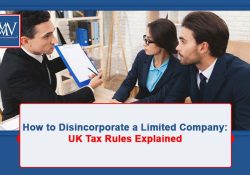Criminal Finances Act 2017
The Criminal Finances Act makes companies and partnerships criminally liable for failing to prevent tax evasion. At Makesworth Accountants, we can provide guidance on the key aspects of the Act and the implications for your business in the Harrow area.
The Criminal Finances Act 2017 (CFA) came into effect on 30 September 2017 and makes companies and partnerships criminally liable for failing to prevent their employees from criminally facilitating tax evasion. A potential defense can be utilized, in cases where the business has put into place a system of reasonable prevention measures. The CFA does not change what tax fraud is, just who may be liable. Here, we take a look at the key aspects of the Act and the implications for your business.
Outlining the new Act
Under the CFA, two new criminal offenses were introduced:
Domestic fraud offense
The domestic fraud offense criminalizes companies, partnerships and relevant bodies for failing to put into place reasonable prevention measures to stop their employees, agents or associated persons from facilitating tax evasion.
Overseas fraud offense
This offense criminalizes corporations trading within the UK who fail to implement reasonable procedures to prevent their employees, agents or representatives from facilitating tax evasion in another jurisdiction.
The new rules apply to tax evasion committed both onshore and offshore and are applicable to all taxes.
Three stages to the facilitation of tax evasion
Under the CFA, there are three stages that apply to both the domestic and the foreign tax evasion facilitation offenses. The first two stages are already offenses under existing criminal law and stage three is a new offense.
Only the UK offense is considered here, additional requirements apply for the foreign offense.
Stage one
The criminal evasion of tax (including national insurance contributions (NICs) is committed by a taxpayer.
Stage two
The criminal facilitation of tax evasion is committed by an ‘associated person’ of the ‘relevant body’.
Stage three
The relevant body failed to prevent its employee from criminally facilitating tax evasion, or failed to implement reasonable measures to prevent the employee from committing the facilitation of tax evasion.
Under the CFA, only ‘relevant bodies’ and legal entities, such as incorporated bodies and partnerships, can commit the new offenses. Natural persons, as opposed to legal persons, cannot commit the offenses.
‘Relevant body’ refers to body corporates (including LLPs), and partnerships (whether incorporated or formed). Meanwhile, a person acts in the capacity of an ‘associated person’ if they are:
- an employee of a relevant body, acting in the capacity of an employee
- an agent of a relevant body, acting in the capacity of an agent
- any other person who performs or intends to perform services for or on behalf of a relevant body, who is acting in the capacity of an individual performing such services (for instance, a subcontractor).
Where stages one and two have been committed, the relevant body is deemed to have committed the new corporate offense (subject to a reasonable defense being claimed).
The new third offense does not essentially alter what is considered to be a criminal act but focuses on who is held accountable.
Making use of a ‘reasonable defense’
Under the CFA, the onus is on the relevant body in question to demonstrate that it has implemented adequate procedures within the business to protect against the criminal facilitation of tax evasion. If the organization can prove that it implemented stringent procedures, the prosecution will be ‘unlikely’.
A relevant body may utilize a defense whereby they can prove that, when the tax evasion facilitation offense was committed, it had appropriate prevention procedures in place.
‘Prevention procedures’ here refers to procedures designed to prevent persons acting in the capacity of someone associated with a relevant body from committing UK tax evasion facilitation offenses. The new Act does not require relevant bodies to implement ‘excessively burdensome’ procedures, but it does require more than ‘mere lip service’.
The government has recommended that organizations within ‘high risk’ sectors, such as banks and financial services companies, carry out thorough risk assessments to establish the likelihood of their associated persons committing the criminal act of facilitation of tax evasion. It is recommended that such organizations follow government advice on the matter.
What does my business need to do?
HMRC has published guidance on the procedures that relevant bodies (ie. your organization) can implement into your business in order to help prevent their associated persons from committing the criminal offense of the facilitation of tax evasion. The HMRC guidance is designed to help you understand the types of processes they can make use of.
The six ‘guiding principles’
The government has outlined six ‘guiding principles’ that can be used to help inform preventative processes. Each of the principles aims to advise organizations in respect of assessing the risk of their associated persons criminally facilitating tax evasion.
1. Risk assessment
As a relevant body, you are advised to assess the nature and the extent to which you are exposed to the risk of their associated persons committing the facilitation of tax evasion. HMRC recommends that you ‘sit at the desk’ of your ‘associated persons’ and consider whether they have a motive, the opportunity and the means to criminally facilitate tax evasion.
You should ask:
- Is the work that ‘associated persons’ carry out subject to monitoring or scrutiny?
- How likely is the criminal facilitation of tax evasion by an ‘associated person’ to be detected?
- Are there any products or services that ‘associated person’ use that could be open to abuse?
- How often do those within high-risk roles receive fraud training, and how vigorously is this training evaluated?
2. Proportionality of risk-based prevention procedures
Your reasonable procedures must take into account the nature, scale, and complexity of its preventative activities. Organizations in sectors such as the banking industry or the accountancy sector may find that they are exposed to more significant risks than others.
3. Top level commitment
Senior management needs to be committed to preventing ‘associated persons’ from criminally facilitating tax evasion. A ‘zero tolerance’ attitude may be adopted, and managers should ensure that the consequences of the criminal facilitation of tax evasion are outlined to their associated persons.
Managers are urged to:
- Outline the consequences of failing to comply with the relevant body’s facilitation of tax evasion policy
- Refrain from utilizing the services of those who do not have the appropriate preventative measures in place
- Communicate the relevant body’s main preventative procedures.
4. Due diligence
In order to mitigate any potential risks, you must ensure you apply proportionate due diligence procedures in relation to persons who perform or intend to perform services on their behalf.
Ask yourselves:
- How well do you know the persons performing tasks on behalf of your organization? Do you need to carry out any additional checks on them?
- Does your organization require annual certificates to show that you are complying with the CFA?
- If you plan to acquire or merge with another business, have you considered the CFA implications?
5. Communication
The associated persons of your organization must receive thorough and adequate training in regard to the criminal facilitation of tax evasion, and prevention policies must be well-communicated, understood and implemented through the workforce.
Your communication should seek to outline:
- The policies and procedures in place to prevent the criminal facilitation of tax evasion
- How to seek advice or report any concerns in regard to the criminal facilitation of tax evasion
- What is meant by tax evasion and associated fraud
- An employer’s duty under the CFA.
6. Monitoring and review
Detailed reviews must be carried out of your preventative measures, and changes must be made to these where necessary. Typically, the nature of the risks you face will evolve over time: as such, senior management must ensure that the organization adapts in response.
Ways to review your procedures:
- Through feedback provided by internal staff members
- Through periodic reviews, accompanied by documented findings
- By working alongside other organizations facing similar risks.
Non-compliance: what are the penalties?
HMRC states: ‘The legislation aims to tackle crimes committed by those who act for or on behalf of a relevant body.’ Under the CFA, relevant bodies who fail to prevent their associated persons from committing the criminal act of facilitation of tax evasion are subject to unlimited fines and ancillary orders, such as serious crime prevention orders or confiscation orders.
How we can help
If you are in the Harrow area please do contact us for guidance on the Criminal Finances Act.
Need Accountancy Support?
For information on bespoke training, or if you have any other questions for Makesworth Accountants, please fill in your details below


















 151
151